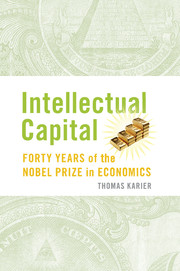Book contents
- Frontmatter
- Contents
- Preface
- Economic Nobel Laureates
- 1 An Economic Prize
- 2 Free-Market Economics
- 3 Micro: The Chicago School
- 4 Stock Market Casino
- 5 More Micro
- 6 Behaviorists
- 7 Keynesians
- 8 Classical Revival
- 9 Inventors
- 10 Game Geeks
- 11 General Equilibrium
- 12 A World View
- 13 Numbers Guys
- 14 History and Institutions
- 15 Reshaping the Prize
- Notes
- Index
- Frontmatter
- Contents
- Preface
- Economic Nobel Laureates
- 1 An Economic Prize
- 2 Free-Market Economics
- 3 Micro: The Chicago School
- 4 Stock Market Casino
- 5 More Micro
- 6 Behaviorists
- 7 Keynesians
- 8 Classical Revival
- 9 Inventors
- 10 Game Geeks
- 11 General Equilibrium
- 12 A World View
- 13 Numbers Guys
- 14 History and Institutions
- 15 Reshaping the Prize
- Notes
- Index
Summary
Not all Nobel Prize–winning microeconomists were part of the Chicago School of Economics or were focused on the stock market. Some, like Sir John R. Hicks, simply applied the microeconomics that they learned in doctoral programs to interesting problems. Microeconomics is a standard part of all advanced studies in economics, and like mathematics or physics, it has a certain appeal because of its well-defined problems and solutions. Hicks was initially attracted to this work and made significant contributions to some of the subfield's basic concepts. While he was never a great mathematician, he had a talent for translating his ideas into simple equations and graphs, providing important tools for other economists. His contributions were not limited to this one field, however, and he was properly recognized by the Nobel Prize committee for equally important contributions to Keynesian economics and general equilibrium.
Another example of a Nobel economist with strong microeconomic skills was William S. Vickrey who used these tools to explore the nature of auctions. He made the surprising discovery that very different auctions will, on average, result in the same revenue. This is a very interesting result and would also be very useful if it were true, but unfortunately the idealized world assumed in microeconomics does not always apply perfectly to the real world. Vickrey also believed that microeconomic analysis could identify the optimum tax, the one that would benefit the most people and do the least damage to the economy.
- Type
- Chapter
- Information
- Intellectual CapitalForty Years of the Nobel Prize in Economics, pp. 73 - 92Publisher: Cambridge University PressPrint publication year: 2010



